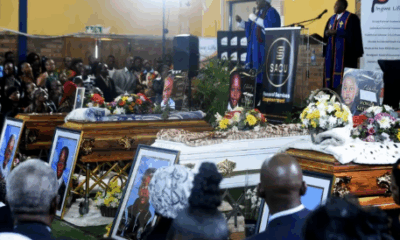News
Magistrates March To Parliament: “We’re Not Asking For More Money, Just To Be Heard”

Magistrates across South Africa are taking to the streets not in pursuit of higher pay, but for something far more fundamental: recognition and respect.
A Call For Fairness, Not Fortunes
On Wednesday, magistrates in Cape Town will march to Parliament during their lunch break, continuing a wave of protests that began two weeks ago in Durban. Their message to President Cyril Ramaphosa and the Department of Justice is clear: after a decade of empty promises and stalled reforms, it’s time to listen.
“This is not a fight for more money; it’s a fight to be heard by the powers that be,” said Magistrate Deni Leppan, one of the leading voices behind the demonstrations.
For many, the protest is rooted in frustration over years of structural neglect. Magistrates say they’ve been waiting nearly ten years for a promised review of their working conditions a process repeatedly delayed by unfilled or lapsed appointments to the Remuneration Commission, the body responsible for overseeing their pay and benefits.
A Decade Of Waiting
The last major review of magistrates’ roles was meant to take place in 2015. Since then, the commission has been operating on an interim basis, often failing to complete its work before its four-year term expires.
“Every time we think progress is being made, the process collapses again,” Leppan explained. “People get appointed, their terms lapse, and nothing gets done. We’re just sitting here waiting.”
This long wait, magistrates argue, has left them lagging far behind their judicial counterparts. Despite having the same qualifications and training as judges, they are denied key benefits such as lifelong salaries and state-funded medical aid.
“We Are Part Of The Judiciary, Not Below It”
The magistrates’ movement has also become a symbolic fight for recognition within South Africa’s legal system. Many see their struggle as part of a broader effort to unify the judiciary and eliminate the outdated hierarchy that treats magistrates as “lesser” judicial officers.
“We’ve been promised by our Chief Justice that we would be acknowledged as local judges, but that recognition has not materialised,” Leppan said. “We are no longer lay persons like we used to be decades ago.”
Silence From The Presidency
Their patience, it seems, has worn thin. A petition sent to the President in December 2024 remains unanswered, and many magistrates now believe regular demonstrations might be the only way to get a response.
Some are even considering leaving public service for private practice if the government continues to delay action. “We don’t know whether it’s worth waiting any longer,” Leppan admitted.
A Justice System In Reflection
The magistrates’ march to Parliament is more than a labour protest; it’s a moral statement about fairness within the very institution meant to uphold it. For a country that often looks to its courts for accountability, the silent struggle of those inside them serves as a powerful reminder that justice begins not only in rulings but in how those who deliver them are treated.
{Source:EWN}
Follow Joburg ETC on Facebook, Twitter , TikTok and Instagram
For more News in Johannesburg, visit joburgetc.com



























